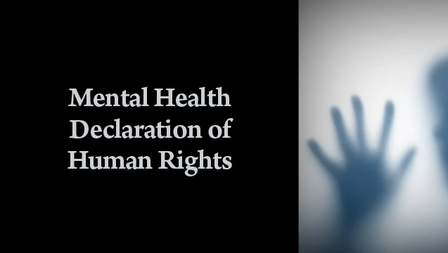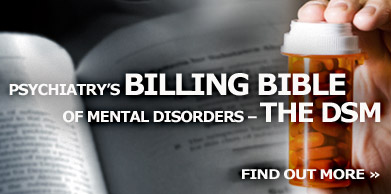The Irish Times, October 11, 2011
by John McCarthy
I AM MAD, a proud member of the mad community. Of course, madness exists – it’s normal, it’s as old as mankind, and it’s in every family. But if I have a disease in my brain called “mental illness”, I want the doctors to prove it. The brain is the most complicated organ in the body, yet doctors diagnose mental illness just by looking at you, and then you are labelled for life.
I’ve been diagnosed with unipolar depression, bipolar or manic depression, dysphoric elation – whatever that’s supposed to be – and paranoia. I’ve been told that I have a chemical imbalance in my brain that shows I have a mental illness. Yet not one of these fellows even took my pulse. They did it by sitting looking at me and talking to me.
I had a breakdown as a consequence of my dysfunctional childhood and because my business was collapsing – the banks were hounding me and I owed thousands. I was locked up for a year. I attempted suicide when I was on my heaviest dose of medication – a mixture of 10 different drugs a day.
There’s no such thing as a sudden breakdown: the madness was like the San Andreas Fault within me, lying dormant and buried. It was like an emotional stroke, a stroke of the spirit rather than the brain. But stroke victims can recover and they aren’t permanently labelled as disabled.
Our mental health laws allow two psychiatrists to sign a piece of paper and lock you up for the rest of your life because you’ve been diagnosed with a mental health problem. It’s based on nothing more than opinion, and that’s part of the cruelty of the mental health system in this country. You can be incarcerated and force treated against your will.
Why try to define madness? We should stop defining. We are all individuals with individual lives, and people react differently to different life situations. But the pharmaceutical industry, working with psychiatrists, tries to mass treat the individual, putting everyone in the same box.
Of course, madness has a downside. I hated it, but my hate was for myself really. I lost the ability to receive love. I was a complete pain in the arse, but my wife and family never stopped loving me. Yet you can learn from being mad. In fact, it was one of the most constructive learning experiences of my life.
I learned how to receive love with confidence. I have learned how to be at peace with who I am.
How do you learn to receive love? Well, if someone says you look well today, you say thank you. That’s the first step, but when I was in my negative side, that felt as hard as climbing Everest.
The Murphy and Ryan reports quite clearly showed that when you give power and authority to one section of the community over another abuse is bound to follow.
Mad Pride Ireland brings out the stories of people who have been abused under this system.
Society has bought into this idea that the mad community is dangerous and to be feared. The nuns got away with the same kind of thing for years with “loose women”; they took the problem part of the community away and buried them.
But we need to be free to ask awkward questions, to challenge the ethos of power and control. There is an aura of fear around psychiatric units. If you’re hopeless and helpless, you’ll be embraced and looked after. If you start asking questions, if you speak out with strength, they don’t want to know. When I started questioning things, I was offered more medication and told I was developing paranoia.
With every Mad Pride event we open up a public playground; there are no protests, no speeches. We scan everyone for normality – clowns use rubber chicken “normality detectors” to check people for signs of normality – and no-one has passed that test yet. We had 17,000 people at our event in Cork, all rocking to the music on a beautiful summer’s day.
It’s all about showing that madness is an everyday occurrence that affects everyone, and it can be dealt with in an open, loving way, with no fear. Now key people are beginning to listen to us. It shows what you can do with no money but a bit of goodwill.
Today I am lying here with motor neurone disease. I prefer the old name for it – creeping paralysis. You lose the use of your limbs, the ability to swallow, you end up incontinent. It’s a relentless disease. But there’s an honesty about the way neurology approaches it. Neurologists admit they don’t know the cause or cure for it.
They have done every test under the sun, I’ve undergone the deepest brain scan imaging in the country. But they admit they don’t know where it comes from and there is no fix, no treatment. Yet a psychiatrist can diagnose you just by looking at you.
I am happy for the psychiatric diagnoses I have had to be scientifically tested. I have a suggestion: I will put myself forward for psychiatrists to carry out any test they wish to do, in public, and I will publish the results. I’m dying, so I have nothing to lose.
But no-one is ever going to get a diagnosis of mental illness out of science: you will only ever get a diagnosis based on an assessment of behaviour. There is no science behind this disease, yet we have given the power of law to this guesswork. How are they getting away with this?
http://www.irishtimes.com/newspaper/health/2011/1011/1224305573629.html




SHARE YOUR STORY/COMMENT